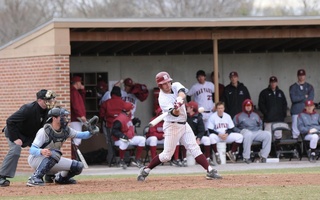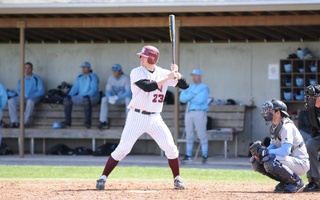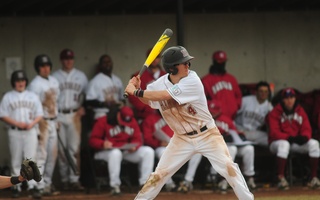Heading into the final weekend of the 2012 season, the Harvard baseball team was still in control of its own destiny—win its next four games and the Crimson would force a one-game playoff for a berth in the Ivy League Championship Series.
Though sweeping Dartmouth in back-to-back doubleheaders—the first at O’Donnell Field and the second on the road—would be no easy feat, the team was in a considerably better position than it was before its final two days of play in 2011.
“It was nice going into that final week and still have something to play for,” says junior third baseman Kyle Larrow.
Last year, Harvard struggled considerably. Not only did it fail to win a quarter of its games—it went 9-36 overall and 5-15 in Ivy play—but the contests in which it did come out victorious, more times than not, seemed to be the result of lucky breaks.
This season, despite winning only a handful more games than it did in the 2011 campaign, the Crimson (12-30, 8-12 Ivy) consistently put itself in good positions to come out ahead but often narrowly missed its goals.
So even though Harvard was unable to take all four matches against the Big Green—the Crimson went 1-3—the squad made strides toward overcoming its recent shortcomings.
The annual Beanpot was no different.
Led by freshman hurler Matt Timoney, who allowed seven hits and one earned run in 7.1 innings, and sophomore shortstop Jake McGuiggan, who went 4-for-5 including two RBIs and a double, the Crimson beat Boston College in the first round of the Beanpot to send it into a finals matchup with the University of Massachusetts.
In the championship game, Harvard found itself down, 8-0, heading into the bottom of the seventh. The contest looked to be a remake of last year’s Beanpot finale in which the Eagles downed the Crimson, 8-0, at Fenway Park; but this year, Harvard was not ready to throw in the towel. Recording five hits—three of them doubles—the Crimson succeeded in rallying in a major way, crossing the plate six times in the inning. Harvard scored one more run in the next frame, but it was unable to capitalize on having a man on base in the ninth, losing, 8-7.
“What the season really boiled down to were those one-run games that are swingers in baseball and could go either way,” Larrow says. “The problem was, more often than not, they didn’t go our way.”
“I thought we pitched better this year, I thought we hit better this year, [and] I thought we fielded better this year,” he adds. “We were just coming up a bit short in those close ballgames.”
Fourteen of the Crimson’s 30 losses were by only one or two runs. The majority of those losses came at the beginning of the season, when Harvard traveled to Arizona, Florida, and New York to face top-tier teams—including then-No. 7 University of Arizona and then-No. 19 Stetson. While the Crimson’s schedule was tough, it still managed to muster out its first win against the Hatters.
“The first win we had against Stetson was huge because it proved that not only could we win a game, but we could win a game against a really good team,” Larrow says. “That was great for our confidence.”
Harvard opened the season with a string of road games, including a spring break trip to Florida where the team filmed its rendition of “Call Me Maybe,” which quickly became a YouTube sensation. While the video got a number of hits, the Crimson’s opponents did as well, causing Harvard to drop 16 of 17 contests to open the season.
But Harvard managed to have more success once it returned home, going 9-11 in its final 20 contests.
Read more in Sports
FEMALE ROOKIE OF THE YEAR, RUNNER-UP: Kelly Weis


















